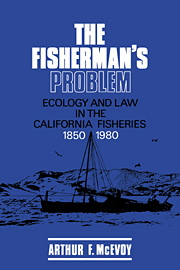
The Fisherman's Problem
Ecology and Law in the California Fisheries, 1850–1980
£29.99
Part of Studies in Environment and History
- Author: Arthur F. McEvoy, Northwestern University, Illinois
- Date Published: April 1990
- availability: Available
- format: Paperback
- isbn: 9780521385862
£
29.99
Paperback
Other available formats:
Hardback, eBook
Looking for an inspection copy?
This title is not currently available on inspection
-
The living resources of California's rivers and coastal waters are among the most varied and productive in the world. They also offer a laboratory example of the mismanagement and waste that have attended the settlement and development of the North American continent. The Fisherman's Problem is a study of the interaction among resource ecology, economic enterprise, and law in the history of the California fishing industry. It analyzes the ways in which the natural environment not only provided the raw material for economic development but played an active role in it as well. As this book shows, the natural environment has a history both independent of, and yet influenced by, classic example of 'common property' re-environmental conservation generally, as well as in the management of the fisheries of the world's rivers and oceans. Professor McEvoy discusses the different ways in which human communities have harvested and managed the region's fisheries, from those of the American Indians and immigrants from Europe and Asia to those of modern, industrial-bureaucratic society. By reconstructing the ecological history of the fisheries during the nineteenth and twentieth centuries, this study develops a new perspective on environmental problems as contemporary observers understood them and on the results of their efforts to deal with those problems. The book concludes with an analysis of significant changes taking place in the 1970s and 1980s in the politics and theory of resource management. By combining a synthesis of recent scholarship in such disciplines as law, economics, marine biology, and anthropology with original research into the fishing industry's history, the book represents a significant new departure in the study of ecology and change in human society.
Reviews & endorsements
'This is a lucid and imaginative account of the interaction between nature, the economic struggle, and the American legal order. It is a strong contribution to the socio-legal history of our country.' Lawrence M. Friedman, Stanford Law School
Customer reviews
Not yet reviewed
Be the first to review
Review was not posted due to profanity
×Product details
- Date Published: April 1990
- format: Paperback
- isbn: 9780521385862
- length: 392 pages
- dimensions: 228 x 152 x 19 mm
- weight: 0.608kg
- contains: 12 b/w illus. 4 maps 5 tables
- availability: Available
Table of Contents
List of figures
List of tables
Preface
Acknowledgments
List of abbreviations
Introduction
1. The problem of environment
Part I. The Miner's Canary:
2. Aboriginal fishery management
3. The Indian fisheries commercialized
Part II. Sun, Wind, and Sail, 1850–1910:
4. Immigrant fisheries
5. State power and the right to fish
Part III. The Industrial Frontier, 1910–1950:
6. Mechanized fishing
7. The bureaucrat's problem
Part IV. Enclosure of the Ocean, 1950–1980:
8. Gridlock
9. Something of a vacuum
10. Leaving fish in the ocean
11. An ecological community
Conclusion
Appendix
Notes
Selected Bibliography
Index.
Sorry, this resource is locked
Please register or sign in to request access. If you are having problems accessing these resources please email [email protected]
Register Sign in» Proceed
You are now leaving the Cambridge University Press website. Your eBook purchase and download will be completed by our partner www.ebooks.com. Please see the permission section of the www.ebooks.com catalogue page for details of the print & copy limits on our eBooks.
Continue ×Are you sure you want to delete your account?
This cannot be undone.
Thank you for your feedback which will help us improve our service.
If you requested a response, we will make sure to get back to you shortly.
×





